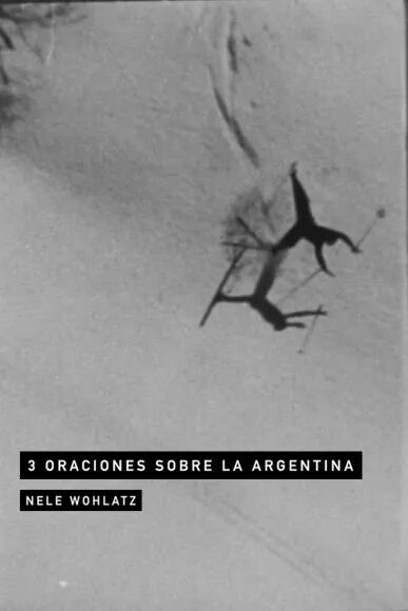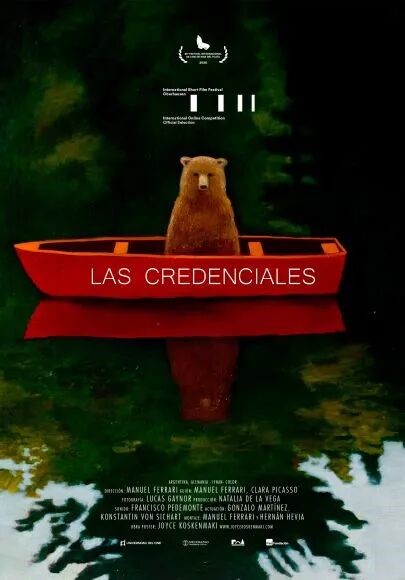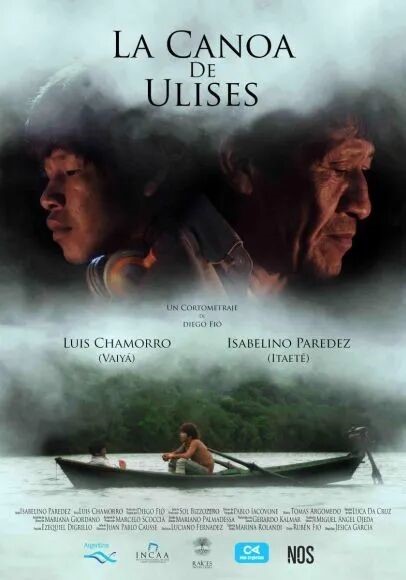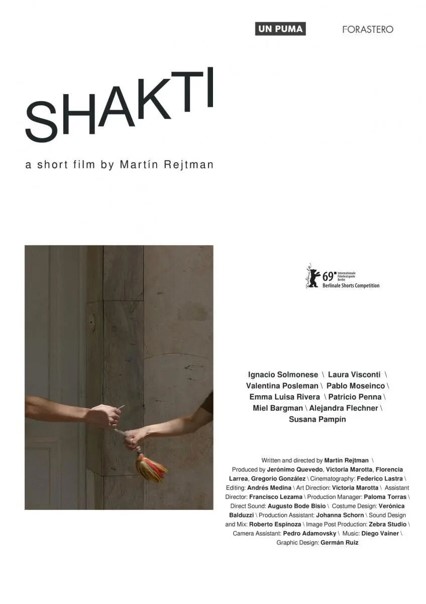Film Review
The Argentine Short Film Selection brings together the best short films by renowned directors to showcase the diverse and vibrant cinematic ecosystem of Argentina. From subtle everyday narratives, absurdist comedies, sharp white to bizarre character shapes, and even the tireless exploration of formal aesthetics – these works vividly interpret the unique artistic charm of Argentina’s top film creation.

3 Prayers on Argentina – Nele Wohlatz
The three sentences about Argentina in Nelly Wolaz’s short film are like a layered dialogue: it starts from archival images and becomes a language class; The process of language classes gradually grows into a gaze upon a country and its history; And ultimately, it quietly turned into a fictional realm.
The ‘game’ of the film comes from clever collages: on one side are old images of Argentine skiers, and on the other side are Spanish language classes in the Buenos Aires Chinese community. The combination of the two creates a tension that is both distant and intimate. If Wolaz’s feature film “Perfect Future” (2016) depicts the wandering and displacement of Chinese immigrants in Argentina, then the three sentences about Argentina are like its B-side – short and light, yet still pointing to the same core: the recombination of identity and belonging, and how to touch those unspoken wanderings and unfamiliarity in the interweaving of language and imagery.
3 Oraciones Sobre La Argentina – Nele Wohlatz
Tres oraciones sobre la Argentina de Nele Wohlatz es un diálogo sobre un material de archivo que se transforma en una clase de idioma, que a su vez se transforma en una mirada sobre un país y su historia, y que también se transforma en una ficción.
Este juego resulta de combinar imágenes de archivo de esquiadores argentinos con diálogos de una clase de español para la comunidad china en Buenos Aires. El corto, así, podría ser el lado B de su largometraje de ficción El futuro perfecto (Argentina, 2016) en la que aborda el desarraigo de los migrantes chinos en el país.

The credentials – Manuel Ferrari
There are countless ways to travel from A to B, and in Manuel Ferrari’s short film documents, this journey seems to depart from the Tigre Delta in Buenos Aires, passing through almost all possible modes of transportation, and finally arriving at the Berlin Film Festival, transforming into a sharp writing about class, mobility, and representation.
The narrative of the film is not complicated: Juan – of course, he can also be called Pedro or Maria – lives and works by the river. He traveled between various modes of transportation until he boarded a flight to Europe. However, upon arrival, he was only “reluctantly accepted” during the immigration review. On that foreign land, he met Johannes – of course, he could also be called Klaus or Franz – a person living in Germany. Seemingly similar daily routines reveal significant differences in details.
Las credenciales – Manuel Ferrari
De A a B hay varios viajes posibles, este en concreto parece que comienza en el delta del río Tigre, en Buenos Aires, y tras pasar por casi todos los transportes posibles se planta en el Festival de Berlín para hacer una lectura afilada sobre la clase, la movilidad y la representación.
Las credenciales de Manuel Ferrari narra el viaje de Juan –que podría ser Pedro o María–, un hombre que vive y trabaja en el río. Juan atraviesa distintos medios de transporte que lo llevan al aeropuerto. Pasado el vuelo, es dudosamente aceptado por las autoridades migratorias europeas. Juan conoce a Johannes –podría ser Claus o Franz–, que trabaja y vive en Alemania y cuya vida no parece muy distinta de la de Juan, pero a la vez lo es.

The canoe of Ulysses – Diego Fió
In Diego Fi ó’s short film Ulysses’ canoe, the wave of globalization also hits the jungle, and intergenerational rifts are particularly evident. A teenager is addicted to so-called ‘urban music’, while an elder relies on the wisdom of their ancestors to cut down trees and build boats, while planting new trees, as if to leave some hope for the unknown future.
On the surface, the film is about the birth of a canoe, but in reality, it depicts a cultural confrontation that not only affects the survival of tradition. Itate and Bahia – an elderly Guarani and a young descendant – worked side by side in the dense forest. The old man tried to pass on his skills and spiritual heritage to the young man, but the young man’s mind always drifted towards music. His true passion lies in rhythm and melody, not in paddles and rivers.
La canoa de Ulises – Diego Fió
En La canoa de Ulises de Diego Fió, la globalización ha llegado también a la selva y la brecha generacional es más notable. Mientras un adolescente está más preocupado por la llamada música urbana, un anciano, con todo su saber ancestral, tala un árbol para poder construir una canoa. Y lo hace a la vez que planta un nuevo árbol, para dejar una herencia a los que quizás, con suerte, puedan venir después.
El corto aborda un enfrentamiento cultural que pone en riesgo algo más que la tradición. Itaeté y Ulises, un anciano y un adolescente guaraníes, están internados en el monte construyendo una canoa. Itaeté trata de inculcarle su legado tradicional, pero el muchacho no está muy interesado. Su verdadera vocación es la música.

Shakti – Martin Rejtman
The short film Shakti is one of the latest works by Argentine director Mart í n Rejtman. The film tells the story of young Federico: after breaking up with his girlfriend Magda, he fell into the abyss of depression. Until one day, he found potato pies left to him by his grandmother who passed away a few months ago in the freezer – a detail that unexpectedly changed the trajectory of his life. As critic Diego Batlle said on Otros Cinemas, Shakti is “a director who has always been obsessed with compiling, recycling, and reinterpreting themes. In less than 19 minutes, he created a personal universe that is both familiar and unique
Shakti -Martín Rejtman
El cortometraje Shakti es uno de los trabajos más recientes del cineasta argentino Martín Retjman. Narra la historia de Federico, un joven que, tras separarse de su novia Magda, cae en un pozo depresivo. Sin embargo, su vida empieza a cambiar cuando encuentra en el congelador de su casa unos knishes de papa congelados que le dio su abuela unos meses antes de morir. Tal como señala el crítico Diego Batlle en su crítica publicada en Otros Cines, Shakti “es un compendio, un reciclaje, una variante y una relectura de las obsesiones de un director que, en menos de 19 minutos, es capaz de construir un universo propio, reconocible y único a la vez”.

Imperfect Present – Iair Said
The unfinished short film, directed and starred by Argentine filmmaker Iair Said, features him as the protagonist Martín—a young man in his thirties. On his birthday, he receives a stunning purple floral dress as a gift. The film does not focus on this garment, traditionally seen as “feminine,” but delves into profound themes of aesthetics and personal identity. “This isn’t my size or my style,” Martín says. “The person who gave me this dress doesn’t even know me,” he complains. “I’d really like to know how they could associate this dress with me.” The film explicitly embraces the dress as an article of clothing a man might wear, skillfully guiding us into a story that defies contemporary societal norms—a world where men wearing dresses is entirely normal.
The entire film demonstrates a harmonious and unified aesthetic between narrative and imagery, making it an outstanding short film—each scene stands on its own, and every line of dialogue is perfectly executed. As a result, the audience will have the opportunity to reflect on the current state of society and find themselves pondering: perhaps this is the most “normal” state of being?
Presente Imperfecto – Iair Said
El director argentino Iair Said presenta el cortometraje Presente imperfecto, donde el mismo interpreta a Martín, un joven treintañero que recibe como regalo de cumpleaños una asombrosa falda floral morada. El problema, no es el hecho de que haya recibido una prenda que es teórica y socialmente reconocida como “femenina”, sino que aborda cuestiones mucho más interesantes a nivel de estética e identificación personal. “No es mi talla, no es mi estilo”, dice Martín. “La persona que me la regaló no me conoce de nada”, “me hubiera gustado saber cómo esta falda le recordaba a mí”, se queja. Existe así una clara aceptación de la falda como posible accesorio masculino, lo que nos sumerge de forma muy sutil en una historia que se despega de las convenciones habituales del mundo actual y ofrece al espectador una realidad donde sería normal que un hombre llevara falda.
La armonía que encontramos a lo largo de la película entre la historia y las imágenes hace de Presente imperfecto un gran éxito donde cada secuencia cuenta por sí misma y cada palabra tiene un lugar bien establecido. Por lo tanto, el espectador tendrá la oportunidad de cuestionar el estado actual de las cosas y preguntarse si quizás es el más… normal.

The forces. – Paola Buontempo
Argentine director Paola Buontempo presents the short film Zhuli. Like a school curriculum, it employs conventional teaching methods and evaluation approaches, with the “subject” to be shaped being the body—a body that requires coordination with others; a small body that should not grow, harboring vulnerability. Zhuli is an observational documentary that records a group of riders in their final training phase before a crucial debut at the La Plata racetrack.
Las fuerzas. – Paola Buontempo
La directora argentina Paola Buontempo presenta el cortometraje Las fuerzas. Como si se tratara de una asignatura escolar, con los métodos y evaluaciones habituales, la materia a modelar es el cuerpo. Un cuerpo que se complementa con otro; un cuerpo pequeño que no debe crecer, de una fragilidad latente. Las fuerzas es un documental de observación de los últimos entrenamientos de un grupo de jockeys antes de su gran debut en el hipódromo de La Plata.

I Killed Antoine Doinel as Nicolás Prividera
I Killed Antoine Doinel is a 9-minute short film directed by Nicolás Prividera in 2019. Taking the opportunity of actor Jean-Pierre Léaud attending a screening in Buenos Aires, the director wrote a funny film about the character of Antoine Doinel. The character was created by François Truffaut and played by Jean-Pierre Léaud.
Yo maté a Antoine Doinel – Nicolás Prividera
Yo maté a Antoine Doinel es un cortometraje documental producido en el año 2019, dirigido por el argentino Nicolás Prividera, con una duración de 9 minutos. Aprovechando la visita del actor Jean-Pierre Léaud a una proyección en Buenos Aires, el director realiza un lúdico ensayo cinematográfico en torno a la figura de Antoine Doinel, personaje creado por François Truffaut e interpretado -e incluso vampirizado- por Léaud.

A Recurring Dream – Santiago Esteves
Recurring Dreams is an Argentine fictional short film directed by Santiago in 2023. Directed by Esteves, the film runs 23 minutes. Ignacio’s world is collapsing—his work, relationships, and personality are all affected—and it all stems from a desperate recurring nightmare: some burning flame threateningly approaches him every night. It’s just a brain joke.
Un Sueño Recurrente – Santiago Esteves
Un sueño recurrente es un cortometraje de ficción argentino producido en el año 2023, dirigido por Santiago Esteves, con una duración de 23 minutos. El protagonista es Ignacio, cuyo mundo se desmorona —afectando a su trabajo, a su pareja y a su personalidad— a causa de una desesperante pesadilla recurrente en la que unos puntos de fuego se le acercan amenazantes cada noche. Sin respuestas médicas y movido por una revista parapsicológica, decide embarcarse en una cómica y surrealista huida para encontrar una supuesta lluvia de estrellas, la más grande de la historia, en un intento por descifrar si su sueño es una visión, una enfermedad o simplemente un capricho de su mente.